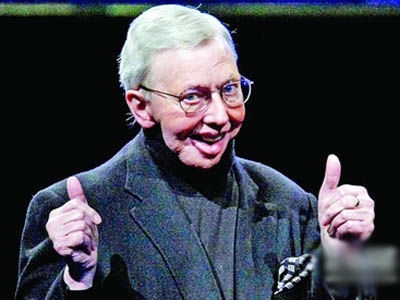JEFFREY BROWN:And finally tonight, remembering the popular movie reviewer and television co-host Roger Ebert. He was the first film critic to win the Pulitzer Prize.
He died today at age 70.
Hari is back with our remembrance.

HARI SREENIVASAN:Ebert was the longtime film critic for The Chicago Sun-Times and was syndicated to more than 200 newspapers. He also became well known for co-hosting a weekly show with fellow critic Gene Siskel. And, in 2005, he received a star on the Hollywood Walk of Fame and spoke about his love for the movies.
ROGER EBERT,Film Critic: Movies are the most powerful empathy machine of all the arts.
When I go to a great movie, I can live somebody else's life a little bit for a while. I can walk in somebody else's shoes. I can see what it feels like to be a member of a different gender, a different race, a different economic class, to live in a different time, to have a different belief.
HARI SREENIVASAN:Ebert began a long battle with cancer in 2002. By 2006, he lost the ability to eat, speak and drink after surgeries for thyroid and salivary gland cancer. He continued to review and write about the movies and his own illness on his blog and on social media, where he reached a robust new audience.
On Tuesday, he announced on his blog that his cancer had returned.
For more, we're joined by David Edelstein. He's the film critic for New York Magazine and for NPR's "Fresh Air."
Thanks for being with us.
DAVID EDELSTEIN, New York Magazine/ “Fresh Air”: My pleasure on this sad occasion.
HARI SREENIVASAN:It is.
So, why was Roger Ebert's voice so large in the film industry?
DAVID EDELSTEIN:Well, it's a funny thing.
Most of us don't remember that, in Ebert's early days, he was a bit of a hell-raiser and a partier, went to the Playboy Mansion, drank a lot. He wrote about all this. But when he sobered up, he decided, I think, that he was going to be a public figure.
Now, most film critics are kind of private, twisted loners, myself included. But Roger almost styled himself an ambassador of the movies and a sort of mayor of movie criticville.
And when he got this show, when he started the show, he was able to, I think, frame certain discussions about the movies, frame his own responses in a way that become enormously appealing to great numbers of people, people who maybe thought of film critics as kind of Rex Reed types who would come on talk shows and drop insults and give their opinions.
Roger had this great gift for being able to speak in whole paragraphs. He knew from his topic sentence what his conclusion was going to be. And he was going to pull you into that, whether you were an elitist pointy head or just a guy wanting to be entertained. He could communicate with you what the joy of movies really was.
HARI SREENIVASAN:He started writing in '67. He won his Pulitzer in, what, '75.
DAVID EDELSTEIN:Yes.
HARI SREENIVASAN:Hasn't been on TV in a half-dozen years, but here's a guy who has got more than 800,000 followers on Twitter. How did he transcend these generations?












